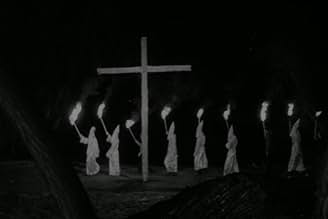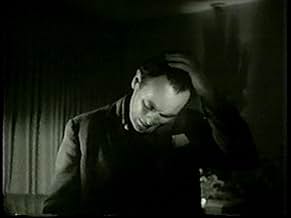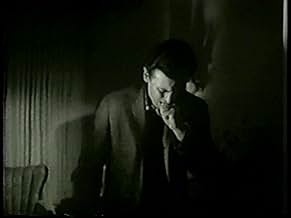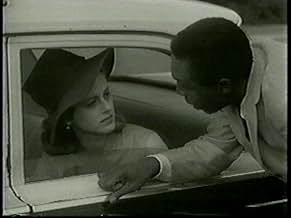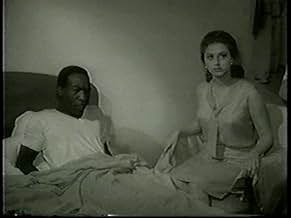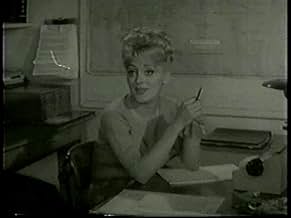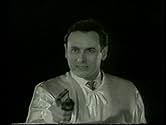After a black man's daughter is killed by the KKK, he seeks revenge by becoming a Klansman.After a black man's daughter is killed by the KKK, he seeks revenge by becoming a Klansman.After a black man's daughter is killed by the KKK, he seeks revenge by becoming a Klansman.
James McEachin
- Lonnie
- (as Jimmy Mack)
W. McLennard
- Wallace
- (as William McLennard)
R.L. Armstrong
- Jenkins
- (as Tex Armstrong)
- Director
- Writers
- All cast & crew
- Production, box office & more at IMDbPro
Featured reviews
What can be said? This movie is as disturbing now as it was when it was made. But the acting is so irregular. Sometimes it's comically bad which makes it extremely uncomfortable. The ending is also disappointing.
"The Black Klansman" is a film from Ted Mikels--the same guy who brought us schlock like "The Astro-Zombies", "Blood Orgy of the She-Devils", "Girl in the Gold Boots" (on IMDb's Bottom 100 list), "The Corpse Grinders" and "The Worm Eaters". So, you can only assume that "The Black Klansman" will be a horrible film, right? Well, not really. As I sat and watched the film I was surprised, as the acting was actually pretty good--something you'd NEVER expect! In fact, while this is an exploitation film, it's an awfully good one.
The story is set partially in the South in the 1960s. Despite civil rights laws, the Klan is strong and lynchings and fire bombings continue. And, following one of these incidents, a very light-skinned black man has had enough. He decides he's going to pass as white and infiltrate the mob! What happens next you'll need to see for yourself, but suffice to say that the film ends on a VERY exciting note--very exciting.
Reasonably well-written, very good and natural acting and competent direction. It sure makes you wonder what Mikels could have done if he had tried harder! Well worth seeing.
By the way, if you like this film, try another excellent low-budget film about race from this same era--"The Intruder" by Roger Corman.
The story is set partially in the South in the 1960s. Despite civil rights laws, the Klan is strong and lynchings and fire bombings continue. And, following one of these incidents, a very light-skinned black man has had enough. He decides he's going to pass as white and infiltrate the mob! What happens next you'll need to see for yourself, but suffice to say that the film ends on a VERY exciting note--very exciting.
Reasonably well-written, very good and natural acting and competent direction. It sure makes you wonder what Mikels could have done if he had tried harder! Well worth seeing.
By the way, if you like this film, try another excellent low-budget film about race from this same era--"The Intruder" by Roger Corman.
After a black man's daughter is killed by the KKK, he seeks revenge by becoming a Klansman.
This film can be dismissed as an exploitation film, and maybe it should be, but I personally thought it was a strong social commentary on color and race in America. Definitely during the 1960s, but probably even to some degree today (2013).
The real honor of this film has to go to the actor who played Jerry, because he had to balance between looking black and looking white and making this believable. He succeeded. I actually do not know if he was completely white or if he was lighter-skinned and black. I could look it up, but I think that his character makes the point -- it does not matter. If he can be treated as either, then race should not matter.
This film can be dismissed as an exploitation film, and maybe it should be, but I personally thought it was a strong social commentary on color and race in America. Definitely during the 1960s, but probably even to some degree today (2013).
The real honor of this film has to go to the actor who played Jerry, because he had to balance between looking black and looking white and making this believable. He succeeded. I actually do not know if he was completely white or if he was lighter-skinned and black. I could look it up, but I think that his character makes the point -- it does not matter. If he can be treated as either, then race should not matter.
It was a rare occasion in 1960's American cinema that the screen would reflect the social turbulence surrounding the civil rights movement, or the fundamentally tense race relations in particularly in the southern states. The white supremacist organisation, the Ku Klux Klan, was a dominant and violent presence which was largely controlled and operated by the local powers of small towns and cities. Whilst the subject was on the surface of the film adaptation of Harper Lee's Pulitzer prize winning novel, To Kill a Mocking Bird (1962), but the cinema mainstream was hardly representative of social conscience until Stanley Kramer's Guess Who's Coming to Dinner (1967). But a few low budget b-movies in the early '60's did attempt to tackle the subject. Roger Corman's under- seen William Shatner starer, The Intruder (1962), or Carl Lerner's Black Like Me (1964), whilst unsuccessful, at least attempted an intelligent, left-field approach. So it seems almost astounding with hindsight, that Ted V. Mikels, shlock director of later atrocities like The Astro- Zombies (1968) or The Doll Squad (1973), would produce a film that would formulate a film that is both sensitive and intelligent about the deep- seated racism within southern state America.
The film opens in the small town of Turnersville, a young, dumb kid walks into an all white diner, upsetting the patrons of the establishment by being the wrong colour. This small act leads to the local faction of the KKK to "retaliate" by shooting the boy then throwing Molotov cocktails at a congregation of a black church. This, along with the burning crucifix, was a reality in these small-minded towns. However, on throwing the fiery bottle at the doorway, the perpetrator witnesses a very young girl being hit directly with the weapon. The father of the girl, travelling musician Jerry Ellsworth (also notably of mixed race - but played by a white actor), heads to the town on hearing the news. Jerry takes himself to a hair salon and transfers himself into a white man (for all intents and purposes). He charms his way into the life of KKK head, and infiltrates the organisation, biding his time to reap revenge on the evil that killed his daughter.
It is of course a ludicrous concept, but the film offers quite emotional and sometimes dramatic scenes. Jerry is also accompanied by a white woman, Andrea (Rima Kutner), who is in love with him and wants a baby with him (something that an alternative title for the film overly focused on, I Crossed the Color Line). This alone would have been a controversial inclusion to the film, but it also balanced this with a more critical commentary on vigilante justice, and mob organisation (particularly on the black group formed in reaction to the attack). The opening scenes where the KKK shoot the young black boy are truly shocking for its time and budget, a scene that resembles the later opening scenes of Mississippi Burning (1989), which are shot quite similarly, staring starkly in the face of the victim. This is not to say that the film is wholly satisfactory, in true Mikels style the film is technically horrific; bad editing, uninspired camera work, the inevitable bad arrangement of scenes and characters. But, at its heart is something quite remarkable. Not revelatory, or even particularly exciting, but nonetheless, the central theme of social segregation is still relevant today (shockingly), and surprisingly some of the acting ain't too bad.
www.the-wrath-of-blog.blogspot.com
The film opens in the small town of Turnersville, a young, dumb kid walks into an all white diner, upsetting the patrons of the establishment by being the wrong colour. This small act leads to the local faction of the KKK to "retaliate" by shooting the boy then throwing Molotov cocktails at a congregation of a black church. This, along with the burning crucifix, was a reality in these small-minded towns. However, on throwing the fiery bottle at the doorway, the perpetrator witnesses a very young girl being hit directly with the weapon. The father of the girl, travelling musician Jerry Ellsworth (also notably of mixed race - but played by a white actor), heads to the town on hearing the news. Jerry takes himself to a hair salon and transfers himself into a white man (for all intents and purposes). He charms his way into the life of KKK head, and infiltrates the organisation, biding his time to reap revenge on the evil that killed his daughter.
It is of course a ludicrous concept, but the film offers quite emotional and sometimes dramatic scenes. Jerry is also accompanied by a white woman, Andrea (Rima Kutner), who is in love with him and wants a baby with him (something that an alternative title for the film overly focused on, I Crossed the Color Line). This alone would have been a controversial inclusion to the film, but it also balanced this with a more critical commentary on vigilante justice, and mob organisation (particularly on the black group formed in reaction to the attack). The opening scenes where the KKK shoot the young black boy are truly shocking for its time and budget, a scene that resembles the later opening scenes of Mississippi Burning (1989), which are shot quite similarly, staring starkly in the face of the victim. This is not to say that the film is wholly satisfactory, in true Mikels style the film is technically horrific; bad editing, uninspired camera work, the inevitable bad arrangement of scenes and characters. But, at its heart is something quite remarkable. Not revelatory, or even particularly exciting, but nonetheless, the central theme of social segregation is still relevant today (shockingly), and surprisingly some of the acting ain't too bad.
www.the-wrath-of-blog.blogspot.com
If ever there was a time and place to utilize the word 'hoot' in reference to a film, the 'Black Klansman' is transcendental material. How is this piece of art not on DVD as of the year 2004? With mighty waving banner of fierce and vengeful fire, the front man of this film undercuts the enslaving white man by going undercover and tearing down the metaphorical burning cross. In a way, this film is to American HISTORY X as SUBURBIA is to SLC PUNK. This is 1966 exploitation baby, and if you've ever heard the 'N' word, you've still never heard it like this! Shocking today even though no one has seen it. Beg, borrow, steal and investigate getting hold of this film directed by the people who brought you film about zombies and machines that grind up women in bikinis. 4 stars.
Did you know
- TriviaMax Julien (Raymond) and Whitman Mayo (Alex) are both members of Kappa Alpha Psi Fraternity Inc.
- ConnectionsFeatured in The Wild World of Ted V. Mikels (2008)
- SoundtracksThe Black Klansman
By Tony Harris
- How long is The Black Klansman?Powered by Alexa
Details
- Release date
- Country of origin
- Language
- Also known as
- I Crossed the Color Line
- Filming locations
- Production company
- See more company credits at IMDbPro
Box office
- Budget
- $80,000 (estimated)
- Runtime1 hour 28 minutes
- Color
- Sound mix
- Aspect ratio
- 1.85 : 1
Contribute to this page
Suggest an edit or add missing content


